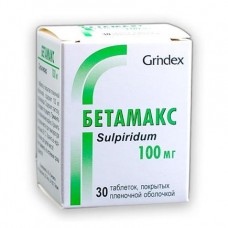Expiration date: 08/2026
Structure and Composition:
Film-coated tablets. 1 tablet contains:
50, 100 or 200 mg sulpiride.
in plastic bottles of 30 pcs.
Characteristic:
Atypical neuroleptic from the group of substituted benzamides.
Pharmachologic effect:
Blocks dopaminergic receptors of the limbic system (the system operates on neostriatnuyu slightly). It does not have a significant effect on the noradrenergic, acetylcholine, serotonin, histamine and GABA receptors.
Pharmacokinetics:
After oral administration, Cmax is reached after 1.5-3 hours Bioavailability -. 27%. Binding to plasma proteins - less than 40%. Concentration in the CNS is 2-5% of plasma concentrations. Provided with breast milk. Do not metabolized. Write mainly kidneys in an unmodified form. In patients with moderate and severe renal insufficiency T1 / 2 increases and is 20-26 hours (after the on / in the introduction).
Description of the pharmacological actions:
Peripheral effects of the drug based on the inhibition of presynaptic receptor (mood improvement associated with increased amounts of dopamine in the central nervous system, and the development of symptoms of depression - to decrease). Antipsychotic effect of the drug is in a dose of 600 mg per day, and stimulating antidepressant - in doses up to 600 mg per day.
In smaller doses may be used as an adjunct in the treatment of psychosomatic diseases, including for the relief of negative mental symptoms of gastric ulcer and duodenal ulcer. When irritable bowel syndrome reduces the intensity of abdominal pain and leads to an improvement of the clinical condition of the patient.
Low-dose (50-300 mg per day) are effective in dizziness, regardless of etiology. It stimulates the secretion of prolactin and has a central antiemetic effect (inhibition of the vomiting center).
Indications:
Schizophrenia (acute and chronic), delirious state, depression, neurosis, vertigo, including with vertebrobasilar insufficiency, vestibular neuritis, Ménière's disease, traumatic brain injury, otitis media. Gastric ulcer and duodenal ulcer and irritable bowel syndrome (as adjuvant therapy).
Contraindications:
Hypersensitivity acute poisoning with alcohol, hypnotics, analgesics, hypertension stage II-III pheochromocytoma, epilepsy hyperprolactinemia state of passion and aggression, lactation, children's age (14 years).
Application of pregnancy and breastfeeding:
Not recommended during pregnancy except in cases where the expected effect outweighs the potential risk to the fetus. At the time of treatment should stop breastfeeding.
Side effect:
From the nervous system and sensory organs: drowsiness, dizziness, sedation, rarely - extrapyramidal syndrome, dyskinesia, oral automatism, aphasia, agitation, sleep disturbances, very rarely - neuroleptic malignant syndrome.
Cardio-vascular system and blood (blood, hemostasis): increased blood pressure, rarely - orthostatic hypotension.
From the digestive tract: dry mouth, heartburn, vomiting, constipation.
From a metabolism: a reversible hyperprolactinemia (galactorrhea, menstrual disorders, rarely - gynecomastia, impotence, frigidity).
Allergic reactions: skin rash, pruritus.
Other: hyperthermia, excessive sweating, increased body mass index.
Drug Interactions:
Sedative effect of narcotic analgesics, antihistamines, barbiturates, benzodiazepines and others. Anxiolytics, alcohol.
co-administration of levodopa should be avoided (mutual antagonism). When concomitantly with antihypertensive drugs increases the risk of orthostatic hypotension.
Dosage and administration:
Inside, in the first half of the day (16 hours), due to the increased level of wakefulness. The maximum daily dose - 1600 mg.
Schizophrenia, psychosis, delirium initial dose - 600-1200 mg per day, in divided doses supporting - 300-800 mg per day.
Depression, from 150-200 mg to 600 mg per day in divided doses.
Dizziness: 150-200 mg / day, in severe conditions - up to 300-400 mg per day. The course of treatment - at least 14 days.
Gastric ulcer and duodenal ulcer, irritable bowel syndrome as adjuvant therapy: 100-300 mg per day in 1-2 reception.
Patients of advanced age: the initial dose - 1 / 4-1 / 2 the adult dosage.
Children over 14 years: 3-5 mg / kg.
When creatinine Cl 30-60 ml / min dose of 70% of the standard 1.5 times or increasing the interval between doses with creatinine Cl 10-30 ml / min - 50% or 2-fold in less than 10 ml / min - 34% or 3 times (dose reduction or increase in the interval between doses, respectively).
Overdose:
Symptoms: blurred vision, hypertension, sedation, nausea, extrapyramidal disorder, dry mouth, vomiting, excessive sweating, gynaecomastia.
Treatment: symptomatic therapy.
Precautionary measures:
Be wary appoint patients with impaired renal function, heart and blood vessel disease, Parkinson's and young women with irregular menstrual cycles. With the development of hyperthermia, the drug should be discontinued. It is recommended to take in the first half of the day (16 hours) due to the increased level of wakefulness. Should not be used during the drivers of vehicles and people skills relate to the high concentration of attention.
During treatment should not drink alcohol.
Betamaks
(Sulpiride)
- Brand: Grindex



